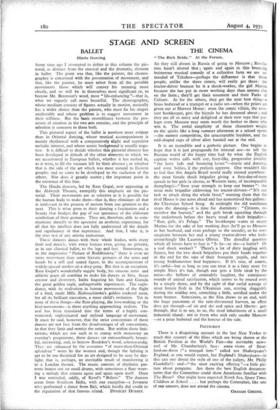THE CINEMA
" The Rich Bride." At the Forum.
So they still dream in Russia of going to Moscow ; Revolu- tion hasn't altered that ; again and again in this bouncing boisterous musical comedy of a collective farm we are re- minded of Tchehov—perhaps the difference is that these people, unlike the three sisters, will really get there: the tractor-driver because he is a shock-worker, the girl Marina because she has put in more working days than anyone else on the farm ; they'll get their tenement and their Parks of Culture. As for the others, they get the next best thing—a brass bedstead or a trumpet or a radio set—when the prizes are given out at Harvest Home: even the comic villain, the assis- tant bookkeeper, gets the bicycle he has dreamed about ; and they are all so noisy and delighted at their new toys that per- haps even Moscow may seem worth the bother to those who win it. The awful simplicity of these characters weighs on the spirits like a long summer afternoon at a school sports —the earnest competition, the unacceptable loyalties, and the odd-shaped cups of silver alloy handed out at the end.
It is an incredible and a pathetic picture. One begins to hope that it is just propaganda for internal use—to tell the Russian world of the happy time had by what the English caption writer calls with coy, fairy-like, progressive joviality " the lusty lads and bouncing lasses "—music and dancing, and even babies, if the prefects approve. One wouldn't like to feel that this Angela Brazil world really existed anywhere: the stout female shock brigadier giving a first-day-of-term speech to her girls (a chorus, to Western taste, of incomparable dumplings)—" Save your strength to keep our banner ": the stout male brigadier addressing his tractor-drivers—" It's our task to attack along the whole front," warning them that the rival House is 200 acres ahead and has economised boo gallons: the Ukrainian School Song. At midnight the old watchman stops the dancing—it is time for dormitory : " Citizens, re- member the harvest," and the girls break squealing through the underbrush before the heavy tread of their brigadier- " Run, girls, it's Pelaga." The bookkeeper wants to marry Marina for the sake of her working days (he'll go to Moscow as her husband, and even perhaps to the seaside), so he sows suspicion between her and a young tractor-driver who looks astonishingly like Laurence Olivier. The dreadful question which all lovers have to face is " Is he—or she—a loafer? Or a real shock worker? " There's a lot of dirty juggling with figures, but the two shock brigadiers put their heads together in the end for the sake of their favourite pupils, and two young Stakhanovites find happiness. If it's true, of course, it's awful—but as long as you can treat it as a fairy story for simple Slays it's fun, though one gets a little tired by the noise—the bellows of comradely laughter, the continuous sounds of animal satisfaction, which seems to be roused even by a simple shave, and by the sight of that awful acreage of stout female flesh in the Ukrainian sun, stirring sluggishly during the midday rest, scratching a little, satisfied under the team banner. Sometimes, as the film draws to an end, with the huge panorama of the rain-threatened harvest, an effect does get through—of air and sky and space and liberty : gets through, that is to say, to us, the tired inhabitants of a small industrial island : not to them who seek only smoky Moscow —or a prize bedstead and the honour of the side.
POSTSCRIPT
There is a disquieting account in the last New Yorker to reach this country of the films which are being shown at the British Pavilion at the World's Fair—the inevitable news- reel of Mr. Chamberlain's face : some views of Strat- ford-on-Avon (" a tranquil item " called not Shakespeare's England, as you would expect, but England's Shakespeare—in this can one detect the style of one of the judges, Mr. Philip Guedalla?): and—" the most exciting offering "—a little pic- ture about penguins. Are these the best English documen- taries that the Committee could show Americans familiar with The River? One might have expected North Sea, Spare Time, Children at School . . . . but perhaps the Committee, like one of our censors, does not attend the cinema.
GRAHAM GREENE.








































 Previous page
Previous page